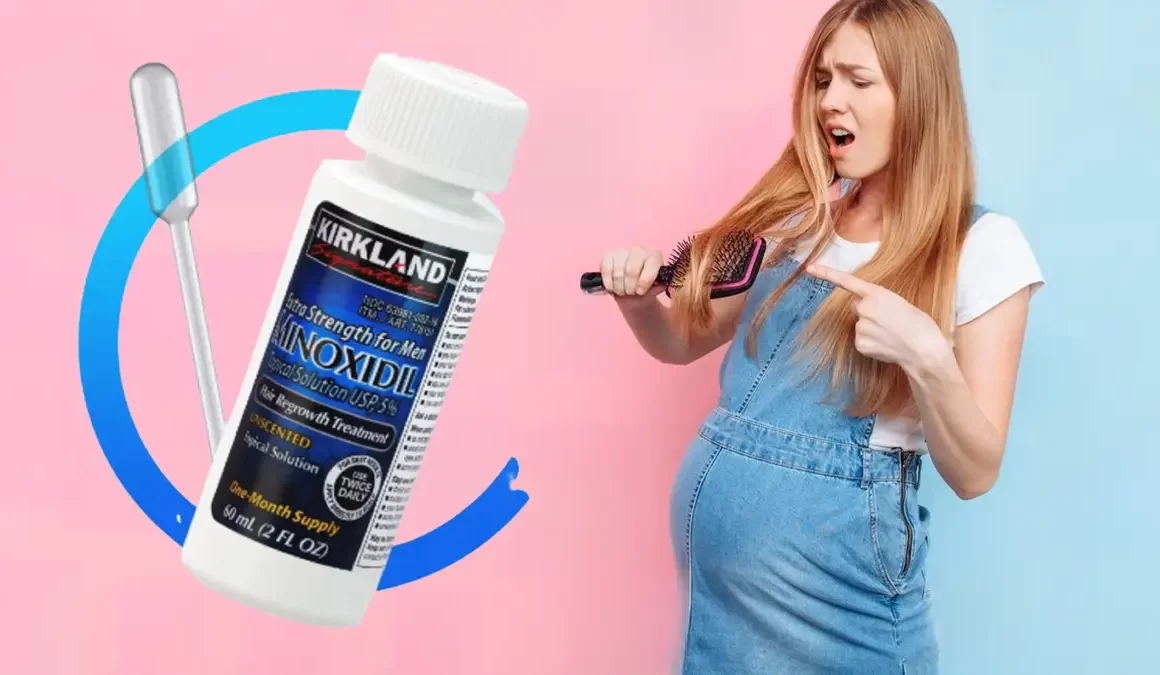During pregnancy, hormonal fluctuations can affect hair growth cycles, leading to hair thinning or shedding in some women. This can be distressing, as hair plays a significant role in our self-image. Minoxidil, a medication commonly used to treat hair loss, is a popular choice for many individuals. However, when it comes to using minoxidil during pregnancy, caution is advised due to potential risks and limited research.
What is Minoxidil?
Developed initially as a remedy for hypertension, Minoxidil expands blood vessels to enhance blood circulation – yielding a vasodilator. It wasn’t until later that a consequential side effect of Minoxidil was revealed: baldness reduction. Capitalizing on this new discovery, topical embodiments of Minoxidil were formulated for hair loss treatment.
How does Minoxidil work?
The hair cycle may have its anagen (growth) phase duration increased and hair follicles are stimulated due to Minoxidil. It could provide vital nutrients to the hair follicles by improving blood flow to the scalp.
Common uses of Minoxidil
Foam or liquid in various strengths can be found over-the-counter for the treatment of androgenetic alopecia, or male/female pattern baldness, using Minoxidil.
Minoxidil Pregnancy Warnings
Animal studies show increased fetal resorption at high doses, but no teratogenic effects. Neonatal hypertrichosis has been reported. Limited data on human pregnancy. The drug is categorized as C in Australia and the US, indicating potential harm to the fetus without malformations. There are no controlled human studies. Use is not recommended, but in certain cases, the benefit may outweigh the risk.[drugs]
Minoxidil, a hair growth treatment, can be absorbed through the skin and have systemic effects. A pregnant woman using minoxidil experienced severe fetal malformations, including brain and vascular abnormalities. The placenta showed ischemic areas and developmental discrepancies. Histological examination revealed excessive angiogenesis and capillary rearrangement. More research on minoxidil’s fetal toxicity is needed before recommending its use in pregnancy.[ncbi]
Minoxidil Safety Concerns during Pregnancy
- 🚼 Minoxidil use during pregnancy raises concerns about potential risks to the developing fetus.
- 📚 Limited research exists on the specific effects of minoxidil during pregnancy.
- ⚠️ Conducting controlled studies on pregnant women is ethically challenging, resulting in a lack of comprehensive data.
- 💡 Consulting with healthcare professionals is essential before using minoxidil during pregnancy.
- 🔍 Healthcare professionals can offer personalized guidance and discuss potential risks and alternative options.
Alternatives to Minoxidil during Pregnancy
🌱 Natural remedies for hair loss:
- Gentle scalp massages
- Mild and sulfate-free shampoos
- Balanced diet rich in vitamins and minerals
💆 Haircare tips during pregnancy:
- Use a wide-toothed comb
- Avoid excessive heat styling
- Protect hair from harsh environmental conditions
🍽️ Dietary considerations:
- Eat foods rich in vitamins and minerals (leafy greens, fruits, lean proteins)
- Stay adequately hydrated
- Incorporate essential fatty acids from fish, nuts, and seeds
summary: Opting for natural remedies like gentle scalp massages, mild shampoos, and a balanced diet can help address hair loss during pregnancy.
Conclusion
- 💇 Hair loss during pregnancy can be distressing.
- 🚫 Caution should be exercised when considering minoxidil during pregnancy.
- ⚠️ Limited research and potential risks are associated with minoxidil during pregnancy.
- 👩⚕️ Consultation with healthcare professionals is necessary when considering minoxidil.
- 💡 Exploring alternative remedies is recommended for managing hair loss during pregnancy.
- 🌿 Adopting a healthy hair care routine can help manage hair loss during pregnancy.
FAQs
Risks of using minoxidil during pregnancy are unclear due to limited research. Minoxidil can be absorbed through the skin, potentially affecting the fetus. Consult a healthcare provider for more information before deciding to use minoxidil during pregnancy.
To manage hair loss during pregnancy, try gentle scalp massages, use mild and sulfate-free shampoos, maintain a balanced diet with fruits, vegetables, lean proteins, and whole grains, stay hydrated, and include foods rich in essential fatty acids like fish, nuts, and seeds.
Handle hair gently, avoid excessive heat styling, protect hair from environmental conditions, maintain a healthy diet, manage stress, and get regular trims for healthier hair.
Safe alternatives to minoxidil for hair loss during pregnancy can be recommended by healthcare providers, such as natural remedies, dietary changes, scalp treatments, or pregnancy-safe hair care products. Consulting with a healthcare professional will help determine the best alternatives based on individual needs.







